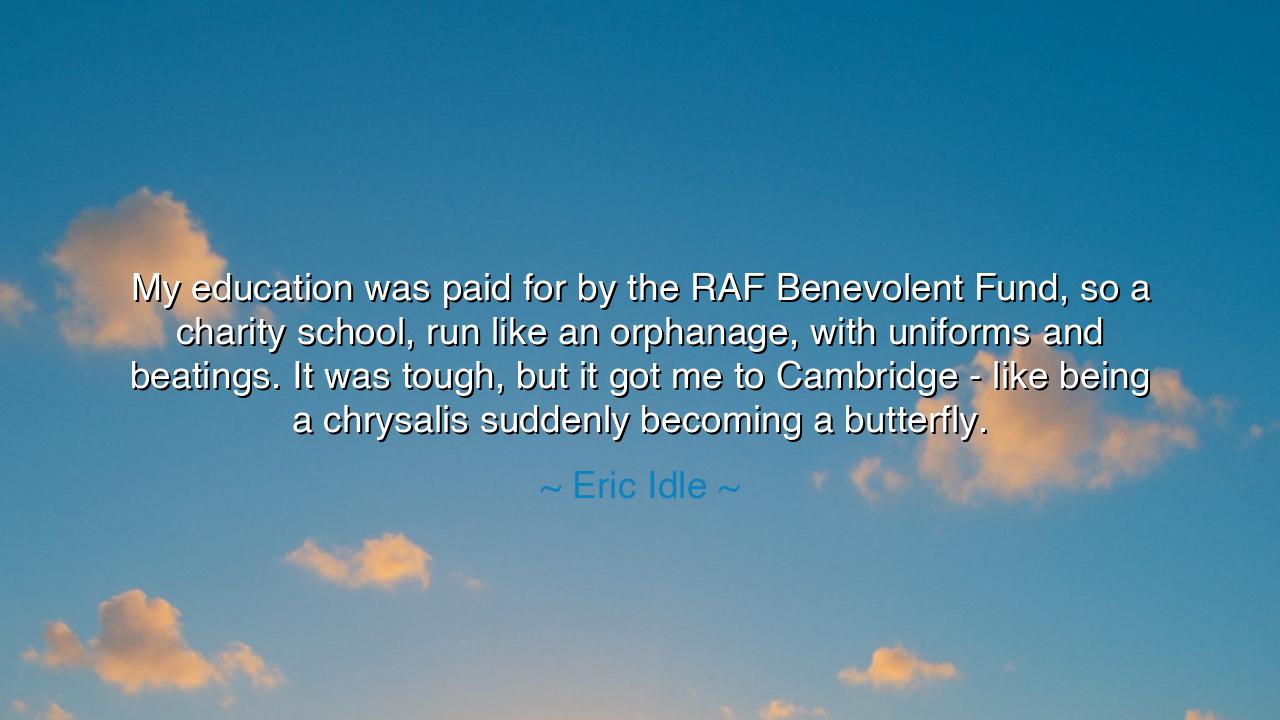
My education was paid for by the RAF Benevolent Fund, so a
My education was paid for by the RAF Benevolent Fund, so a charity school, run like an orphanage, with uniforms and beatings. It was tough, but it got me to Cambridge - like being a chrysalis suddenly becoming a butterfly.






“My education was paid for by the RAF Benevolent Fund, so a charity school, run like an orphanage, with uniforms and beatings. It was tough, but it got me to Cambridge — like being a chrysalis suddenly becoming a butterfly.” Thus spoke Eric Idle, the brilliant humorist, writer, and one of the legendary voices behind Monty Python. In this reflection, Idle speaks not with bitterness, but with a strange tenderness toward hardship. His words hold the weight of a life that began in struggle, yet emerged in light. They tell of the transforming power of education, of endurance, and of the human spirit’s ability to turn suffering into strength — to evolve, like a chrysalis becoming a butterfly, from confinement to flight.
Idle’s story begins in the shadow of war. His father, an airman of the Royal Air Force, was killed in a tragic accident when Eric was but a child. Left without a father and with few means, the young boy was sent to a charity school funded by the RAF Benevolent Fund, an institution built to care for the orphans of servicemen. It was not a place of comfort or affection. It was strict, cold, and severe — “run like an orphanage,” as he said, “with uniforms and beatings.” Yet within those walls of discipline and deprivation, something began to take root. Though the world seemed cruel, it was also preparing him — tempering his mind and will as fire tempers steel. For in the ancient rhythm of life, suffering is not the end, but the forge from which greatness is drawn.
When Idle likens his journey to a chrysalis becoming a butterfly, he captures the eternal symbol of transformation. The chrysalis is a dark, narrow place — silent, constraining, almost suffocating. Yet within that stillness, life stirs. The creature that once crawled begins to change its very nature. Wings grow where there were none; strength forms in unseen places. Then, in time, the shell breaks open, and what once seemed imprisoned takes flight. So it was with Idle: the rigid uniform of the orphanage became the cocoon from which his freedom emerged. Education was not merely his escape — it was his metamorphosis. It carried him to Cambridge, that ancient sanctuary of thought, where his mind could finally soar and his imagination find its voice.
This story echoes across history, for the world has ever been shaped by those who found light through hardship. Consider the young Abraham Lincoln, born in poverty on the frontier, self-taught by the dim glow of a fireplace, who rose to guide his nation through its darkest hour. Or Helen Keller, who, locked in silence and darkness, discovered the universe through touch and patience. Like Idle, their early years were marked by confinement and trial, yet these trials became the womb of greatness. For it is often in adversity that the seeds of genius germinate, and in discipline that the soul learns its power.
What Idle teaches us, then, is not merely a tale of gratitude, but of transformation — that education is not only the filling of the mind, but the awakening of the spirit. It is not always gentle; it may wound before it heals. Yet to endure it is to grow, and to grow is to be reborn. His words carry a subtle triumph: that even from pain, beauty can arise. The orphanage’s harshness could have broken him, but instead it gave him resilience, wit, and the capacity to see life not with despair, but with humor — the rarest and most profound form of wisdom. For laughter, as Idle would later prove through his art, is the song of the soul that has survived its trials and still chooses to sing.
In this, his story becomes a lesson for all who walk through hardship. When life feels like the narrow walls of a chrysalis — when circumstance binds and wounds — remember that within such confinement lies the promise of flight. Education, whether of the mind or of the soul, is often born in discomfort. It is the discipline of endurance, the courage to learn when learning is hard, the faith that the struggle itself has meaning. The butterfly cannot skip the cocoon; the man cannot skip his trials. Both must trust in the unseen transformation happening within.
So, my children, take this teaching to heart: let not suffering make you bitter, but better. If your road is rough, walk it with purpose; if your schooling is harsh, let it sharpen your will. Seek always to learn, even from pain, and hold fast to the vision of what you are becoming. For as Eric Idle reminds us, hardship may bruise the body, but it strengthens the wings. And when at last you emerge — when you rise from the chrysalis of trial into the light of your own becoming — you will know that even the darkest seasons were shaping you for flight.
Thus, cherish your transformation. For every beating endured, every struggle faced, every lesson hard-won — these are the threads that weave the wings of freedom. Let your life, like Idle’s, prove that from the coldest schools of discipline can emerge the warmest hearts, and that the journey from confinement to creativity is the most beautiful metamorphosis of all.






AAdministratorAdministrator
Welcome, honored guests. Please leave a comment, we will respond soon